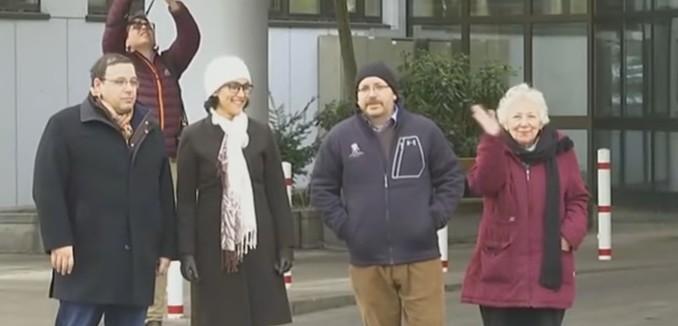American officials did not allow Iran to take possession of a planeload of $400 million in European currencies until three American hostages were freed, raising concerns that the Obama administration paid a ransom for their release, The Wall Street Journal reported Wednesday.
According to U.S. official who were familiar with the sequence of events, the United States did not allow Iran to take possession of the cash until the plane with the three hostages – Jason Rezaian, Amir Hekmati and Saeed Abedini – was “wheels up.”
On January 16, the nuclear deal’s official Implementation Day, the United States announced the end of nuclear sanctions on Iran. It also lifted sanctions on a number of Iranian entities, including Iran Air, Iran’s national carrier. That same night, the three Americans who had been held in Iran for, in some cases, years, were supposed to leave the country by plane, but were held overnight.
The following day, the Journal reported, the cash was sent from Geneva on a plane operated by Iran Air.
“Our top priority was getting the Americans home,” said a U.S. official. Once the Americans were “wheels up” on the morning of Jan. 17, Iranian officials in Geneva were allowed to take custody of the $400 million in currency, according to officials briefed on the exchange.
Abedini said in an interview earlier this month that an Iranian intelligence officer told him that the hostages could not be let go until the Iranians received more information about “another plane.”
The Obama administration claims that the $400 million was intended to settle a debt stemming from military equipment that the Shah of Iran had paid for in 1979, but could not collect because of the subsequent Islamic Revolution. Administration officials have acknowledged paying an additional $1.3 billion interest on that debt, but have not disclosed how the payment was made.
Congressional critics of the nuclear deal are seeking answers from the Obama administration about the alleged ransom. Rep. Sean Duffy (R – Wis.), chairman of the House Subcommittee on Oversight and Investigations, sent letters to the Federal Reserve and the Justice and Treasury departments asking for all records regarding the exchange with Iran.
Duffy also requested that Attorney General Loretta Lynch document all “persons within the [Justice] Department authorizing or otherwise taking steps to carry out the payment.” The $400 million payment was made despite concerns expressed by senior Justice Department officials that the payment would appear to be a ransom.
Brig. Gen. Mohammad Reza Naqdi, commander of Iran’s Basij militia, said in January that the $400 million payment “was returned for the freedom of the US spy and it was not related to the [nuclear] negotiations.”
According to Iranian media reports, the $1.7 billion interest payment has been earmarked to boost Iran’s military spending by 90% for next year.
[Photo: CBSN / YouTube ]




